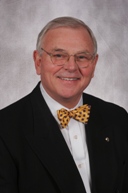Gary P. Jolly, DPM, FACFAS
Our profession, and specifically your College, lost a legend when Gary P. Jolly, DPM, FACFAS, passed away on January 30, 2010 after a courageous battle against cancer.
At the 2009 Annual Scientific Conference, Dr. Jolly spoke at a session entitled “Legends Corner,” where he could speak about anything he wished. Dr. Jolly was already diagnosed with cancer, his face clearly showing the changes of a long hard fight. His speech was moving, insightful, and, upon reading, you may be compelled to “pick up the colors and lead” your profession into the future.
The Words of Dr. Jolly
 As I approach my 30th year of practice, and approach the twilight of my career, looking back at the growth of our specialty gives me a wonderful sense of accomplishment. When I began as a first-year medical student, there was no separate designation for foot and ankle surgeons. Everyone was a podiatrist, and everyone in clinical practice was a general podiatrist.
As I approach my 30th year of practice, and approach the twilight of my career, looking back at the growth of our specialty gives me a wonderful sense of accomplishment. When I began as a first-year medical student, there was no separate designation for foot and ankle surgeons. Everyone was a podiatrist, and everyone in clinical practice was a general podiatrist.
A few, typically Fellows of the American College of Foot Surgeons, as it was called back then, also engaged in foot surgery. Although hospital privileges were available to some, most podiatrists performed surgical procedures in their offices without the benefit of sedation or general anesthesia. This was the state of our profession in 1971.
My first exposure to clinical podiatry was in the outpatient clinic at the old Pennsylvania College of Podiatric Medicine (PCPM). The clinic wasn’t air conditioned, and summer clinics were physically brutal. What I found even more brutal was the limited practice that was podiatry at that time. As a well-educated, assertive, and impatient youth, I had a very difficult time correlating the depth of my pre-clinical education with the provision of routine care.
And then a wonderful thing happened. Harold Schoenhaus, DPM, and later Guido LaPorta, DPM, joined the faculty at PCPM. Dr. LaPorta became my mentor as a student and resident. He was a surgeon with an incredible mind who thought “outside of the box.”
What exactly does outside the box mean? It means to think critically, not accepting implausible explanations to clinical problems; and not to be afraid of being an iconoclast if, after studying the problem, you arrive with a different set of ideas.
I decided that I wasn’t particularly enchanted with the idea of practicing general podiatry. I wanted to be a foot and ankle surgeon. When I shared my aspirations with faculty and colleagues, I was laughed at by friends and rebuked by teachers for over-reaching.
I am extremely fortunate for a great number of reasons, not the least of which is the honor that I have to be a teacher to our Yale residents, fellows, and students. An amazing thing happens when I share my personal philosophy — they listen and they get it! What a difference 30 years makes.
The landscape of podiatry during the last three decades has changed dramatically. By foot and ankle surgery becoming an acknowledged sub-specialty within podiatry, recognition and acceptance by the medical community has been achieved. Although there may still be pockets of resistance, hospitals and clinics, including orthopedic practices, are now open to us.
Surprisingly, there are still some within podiatry who are opposed to our specialty. In fact, there are those within the “leadership” of the profession who would prefer to restrain us in order to create a more homogenous profession. Should we roll back our education and experience to achieve their goals?
Progress is inevitable. In medicine and dentistry, the development of specialization occurred many decades ago. It was only natural that such specialization should occur in our profession as well. Failure to recognize the inevitable is shortsighted and foolish. While some in the profession have abandoned the College, the College has not abandoned the profession.
I would also like to address a few remarks to our young members, particularly those who are still in residency. The ACFAS Fellows you see here today, as well as those who have gone before us, have opened up the professional world for you. The sociopolitical advancement of podiatric foot and ankle surgery didn’t come easily. A great deal of energy and resolve on the part of “us old guys” was needed to move this specialty forward.
We have done what we could and now the mantle of leadership falls squarely on your shoulders. Who among you will pick up the colors and lead? Who will stand up and say, “Follow me?” If you wait for someone else to do it, it won’t get done. Your professional identity is enhanced by the presence of the letters FACFAS after your degree. You have a debt, an obligation to support the College and help it to grow and mature.
I once had a dream, and it was fulfilled. I have had another dream, one of parity and collegial co-operation between our College and the American Orthopaedic Foot and Ankle Society. Some would ask why — I would ask, why not? Let us set our own limits and not be restricted by those who are afraid of change and opposed to professional growth. We should never be afraid of progress and we should never let others determine our future.
Thank you for your attention and patience, and God bless.
God bless you, Dr. Jolly. You will be sorely missed.
Dr. Jolly was known for his insightful President’s Perspective columns. Below are links to his articles. His insight and passion for our specialty and College was always apparent.
